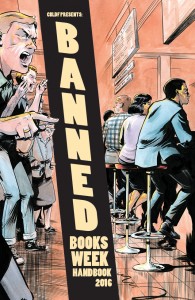 We may be currently in the middle of Banned Books Week, but challenges happen all year round. In addition to educating the public about censorship attempts during this annual event, it is absolutely essential for both school and public libraries to have clearly written policies outlining how they will handle requests to remove or restrict certain materials. In a column this week for School Library Journal Jamie LaRue, executive director of the American Library Association’s Office for Intellectual Freedom, provided some tips on crafting sound challenge policies.
We may be currently in the middle of Banned Books Week, but challenges happen all year round. In addition to educating the public about censorship attempts during this annual event, it is absolutely essential for both school and public libraries to have clearly written policies outlining how they will handle requests to remove or restrict certain materials. In a column this week for School Library Journal Jamie LaRue, executive director of the American Library Association’s Office for Intellectual Freedom, provided some tips on crafting sound challenge policies.
A survey conducted by School Library Journal found that some sort of challenge policy covering library materials exists in 81% of U.S. public schools and only 59% of private schools. As LaRue points out, that figure should be 100% for all schools. In the absence of a challenge policy, decisions to ban certain books are often made unilaterally by principals, superintendents, or other administrators without input from teachers, librarians, students, and parents.
Many challenges come from individuals looking to gin up media controversy, or simply reacting emotionally to content they don’t want their own children to access. A good policy requires the request to be submitted in writing, which not only provides documentation of the challenge but also gives the complainant a chance to reconsider whether the material really needs to be banned for all students. Many challenge forms ask if the complainant has read or viewed the entire book or other material in question, and whether they would be satisfied with having only their own child barred from accessing the item. Most challenges can be halted at that point to the satisfaction of all parties involved, while protecting the First Amendment rights of the greater student body.
If a challenge does proceed past that point, the next step is usually the formation of a review committee often made up of a good mix of teachers, librarians, administrators, parents, and sometimes students. Ideally this will ensure that the viewpoints of a variety of constituencies are considered, and that no one person or interest group is permitted to dictate what is appropriate for the entire school. The scrupulous observance of policy doesn’t always prevent challenges from turning into drawn-out and contentious affairs, but it certainly helps to cut down on overzealous bans and restrictions while reassuring the general public that all complaints are handled fairly and transparently.
If your school library currently lacks a clear challenge policy, check out these OIF resources that can help:
- Sample form: Request for Reconsideration of Library Resources
- Applying the rules of intellectual freedom in libraries
- Preparing for challenges
- Helping everyone understand the reconsideration process
Read Jamie LaRue’s column about the importance of challenge policies and other collection development issues in school libraries here.
Help support CBLDF’s important First Amendment work in 2016 by visiting the Rewards Zone, making a donation, or becoming a member of CBLDF!
Contributing Editor Maren Williams is a reference librarian who enjoys free speech and rescue dogs.